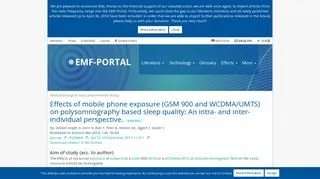
In 90% of the subjects, one or more sleep parameters were significantly different during exposure to GSM or WCDMA/UMTS fields compared to the sham exposure condition. However, effects showed no consistence between individuals except for an increased REM sleep duration (9 subjects during GSM exposure, 10 subjects during WCDMA/UMTS exposure).The authors conclude that exposure of subjects to a GSM (900 MHz) or a WCDMA/UMTS (2 GHz) electromagnetic field might induce individual changes in the sleep structure and a general prolongation of the REM sleep phase. These changes do not necessarily indicate a disturbance of sleep.
Study funded by: Deutsches Mobilfunk Forschungsprogramm (DMF; German Mobile Phone Research Programme) at Federal Office for Radiation Protection (BfS)
My highlights. The link is to an article summary; the original is paywalled. You may be able to find it with a deeper search.
Source of shared Link
